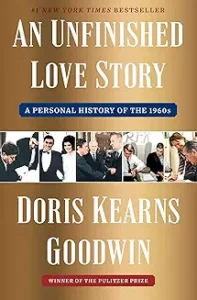An Unfinished Love Story: A Personal History of the 1960’s by Doris Kearns Goodwin 2024
I loved this book, as, I predict, anyone who was in college or even high school in the 1960’s will, as well.
Several years ago, Doris Kearns Goodwin and her husband, Richard, decided to dive into the dozens of boxes which held the latter’s notes, drafts, speeches, and memorabilia from a life spent in public service, most importantly as a speech writer and advisor to JFK, LBJ, Eugene McCarthy, and RFK. If you need help with these abbreviations, turn back now, but if reading them raises your heart rate, even just a little bit, press on and read this book.
Goodwin was somewhat of an enfant terrible. Growing up in NYC, he graduated from Harvard College and Harvard Law School. At the latter, he presided over the Law Review, a position that earned him a clerkship with Supreme Court Justice Felix Frankfurter. In 1960, at the age of 29 he came to the attention of Ted Sorenson, the chief advisor and speech writer for John F. Kennedy, the junior senator from Massachusetts who was launching his bid for the Democratic nomination for President. Sorenson hired him, and for the next year, Goodwin traveled all over the country with JFK, Sorenson, Pierre Salinger, Arthur Schlesinger and the other members of the Kennedy circle through the successful outcome in November, the inauguration in January, and the first three years of the Kennedy administration. Goodwin was a key player and the major speech writer through the Bay of Pigs fiasco, the Cuban missile crisis, the creation of the Peace Corps, the launching the space race and dozens of other events. When it all came crashing down on November 22, 1963, he was among the few Kennedy people who were in DC and who arranged the White House to accept JFK’s body later that night.
When LBJ asked him to stay on, the second chapter in this saga began. Goodwin wrote LBJ’s State of the Union speeches and many of the speeches launching the Great Society and key pieces of legislation—the Civil Rights Act, the Voting Rights Act, Medicare and Medicaid, housing and educational laws to address discrimination and poverty. He was at the center of Johnson’s political world which operated 7×24, traveling to the ranch in Texas and writing in his White House Office. The tragedy of LBJ’s downfall in Vietnam is passionately described.
When LBJ declined to run in 1968, Goodwin urged his friend Bobby Kennedy to go for the nomination, but when RFK declined, Goodwin joined the McCarthy campaign only to return to RFK when the latter jumped into the race after McCarthy’s victory in NH. Jubilation over the California primary victory turned to ashes as RFK was murdered that night, only weeks after the assassination of Martin Luther King. The chaos and bloodshed of the 1968 Democratic convention and Hubert Humphrey’s defeat by Nixon conclude the book.
All of this is written with passion and clarity by DKG as she and her husband work their way through box after box of material. Along the way we learn of her own unique rise in the world of politics and government. Becoming a political activist while at Colby by the Watts riots and Vietnam, Kearns applies for and is named a White House Fellow in 1968, simultaneously with the publication of an article she wrote in The New Republic arguing for LBJ’s replacement. Despite that awkward start, LBJ recognized talent and recruited her to the White House to begin to help him write his memoirs. Until his death in 1973 at the age of 64, DKG was his ‘listener’ and ‘recorder’ as he talked for hours about his early years and his political life.
This is a remarkably good book and a must for anyone who remembers the tumultuous ’60’s. It records the political events that still resonate today, the unparalleled productivity of the 89th Congress spurred on by Johnson’s efforts to address poverty and discrimination. The tragedy of the three assassinations. The Greek-tragedy scale of LBJ’s failure to end the war in Vietnam, and on and on. It’s also a love story, telling the tale of how Kearns and Goodwin met at Harvard when she was a young faculty member and he was a visiting fellow.
I was struck by her disciplined focus on the events recorded in Goodwin’s papers. There’s no specualtion about the JFK assasination and the conspiracy theories that reverberated around it. There’s no ‘what if’s’ about the 1968 election, LBJ’s Vietnam tragedy, or the rise and fall of Nixon. This focus helps make the book the wonder that it is. Read it, by all means.



